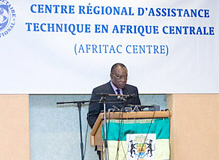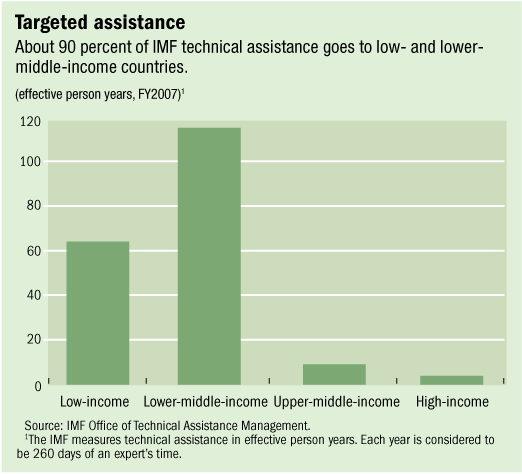
Typical street scene in Santa Ana, El Salvador. (Photo: iStock)
IMF Survey: IMF Looks to Step Up Work with Donors
November 26, 2007
- IMF spends around $190 million to help members strengthen capacity, policies
- More than 25 bilateral and multilateral donors provide funding
- Key donors include Japan, the United Kingdom, and Switzerland
Providing technical advice and know-how to member countries is a vital role of the IMF in a globalized economy.

Paul Toungui, Gabon's Finance Minister, opens IMF regional technical assistance center in Libreville in January (IMF photo)
IMF technical assistance
The Fund is seeking to enhance its partnership with donors in its technical assistance program. The aim is to improve the effectiveness of IMF technical assistance and training by leveraging on the development assistance strategies of donors.
A key benefit of IMF membership, technical assistance—over 80 percent of which goes to low- and lower-middle-income countries (see chart)—is aimed at building the institutions and skills needed by countries to design and implement macroeconomic policies that promote growth. To ensure strong country ownership, IMF technical assistance is designed and delivered within the context of each recipient country's economic reform strategy and priorities.
Partnering with external donors
Although the largest portion of IMF technical assistance is funded with its own resources, contributions from bilateral and multilateral donors have played an increasingly significant role in enabling the IMF to meet country needs in this area.

"The participation of donors in our technical assistance program flows naturally from our mandate to promote international economic cooperation," says IMF Deputy Managing Director Murilo Portugal. "We believe that strong partnerships between recipient countries and donors enable IMF technical assistance to be developed on the basis of a more inclusive dialogue and within the context of a coherent development framework. The benefits of donor contributions therefore go beyond the financial aspect."
Beginning in the early 1990s, IMF cooperation with donors on technical assistance projects has grown steadily. External support—provided in the form of donor grants to the IMF—now finance around one-fifth of the IMF's total technical assistance. Of the more than 25 donors who support this work, the government of Japan remains the single largest contributor.
Since 1990, total Japanese support for the IMF's technical assistance program has exceeded $230 million, covering projects in more than 120 countries in all areas of the IMF's expertise. Apart from Japan, the United Kingdom's Department for International Development and Switzerland's State Secretariat for Economic Affairs represent two other key contributors to the program, each financing over $20 million worth of technical assistance over the past decade.
" The participation of donors in our technical assistance program flows naturally from our mandate to promote international economic cooperation.—Murilo Portugal"
As the IMF's technical assistance program continues to develop, donor partnerships have similarly expanded to include grants from Australia, Austria, Brazil, Canada, China, Denmark, Finland, France, Germany, India, Ireland, Italy, the Republic of Korea, Luxembourg, the Netherlands, New Zealand, Norway, Portugal, Russia, Singapore, Slovenia, Spain, Sweden, the African Development Bank, the Asian Development Bank, the European Commission, the European Investment Bank, the Inter-American Development Bank, the United Nations Development Program, and the World Bank.
Unique tripartite arrangement
In working with donors to finance technical assistance, the IMF is fostering a unique tri-partite arrangement. According to Alfred Kammer, Director of the IMF Office of Technical Assistance Management, "We see in the IMF's technical assistance program very powerful opportunities in which donors, recipient countries, and the IMF can join hands to strengthen economies around the world:
• First, IMF technical assistance is integrated with its surveillance and lending activities, and the resulting synergies enable our technical assistance to be designed and delivered as part of the institution's regular ongoing dialogue with countries. Our recipient countries appreciate the fact that, when the IMF makes certain recommendations in surveillance or lending programs, it can support the implementation of those recommendations with technical assistance. Donors in turn appreciate that, when they finance a technical assistance project, they can be assured that the assistance will be delivered in close consultation with the recipient country.
• Second, IMF technical assistance is concentrated in macro-critical areas where the Fund has the greatest comparative advantage. And, with its near universal membership, IMF assistance is informed by experience and knowledge gained across diverse regions and countries at different levels of development. Recipient countries and donors alike seek to work with us because they see that we deliver a high-quality product.
• Third, by working closely with each other, both the IMF and donors are able to better coordinate their respective assistance to countries. This avoids wasteful duplication of efforts, and reflects the aspiration towards greater cooperation between development partners under the Paris Declaration on Aid Harmonization."
The IMF's Regional Technical Assistance Centers (RTACs) provide a particularly vivid illustration of strong collaboration between the IMF, its donors, and countries receiving technical assistance. The six RTACs—located in Gabon, Mali, Tanzania for Africa; in Barbados for the Caribbean; in Lebanon for the Middle-East; and in Fiji for the Pacific Islands—receive the bulk of their funding from donor countries, international agencies, and regional development banks.
Experience with these centers has been very encouraging, with many singling out the RTACs' governance structure for special praise. Under this framework, strategic guidance for each center's work program is provided by a steering committee comprising representatives from beneficiary countries, donors, and the IMF. This arrangement has served to ensure strong ownership of each center's activities by all stakeholders.
Strengthening donor partnerships
Looking ahead, building closer relationships with donors, recipient countries, and other development partners is a key objective of the IMF. "We have established donors who are ardent supporters of our technical assistance, and these relationships must be reinforced," says Kammer, adding: "To do that, the IMF will continue to improve efficiency in its technical assistance delivery, including by enhancing transparency and demonstrating concrete results."
The IMF is also looking to better engage donors by adopting a medium-term approach to planning its technical assistance. This would afford the institution greater ability to match countries' technical assistance needs with donors' financing strategies, resulting in a unique "win-win-win situation" all around.
A grouping of articles examines different aspects of IMF technical assistance:
Budget Reform Holds Promise in Mozambique
A cornerstone of Mozambique's reconstruction since the end of its civil war in 1992 has been the committed application of far-reaching, donor-funded and IMF-supported public financial management reform.
Tailoring Regulation for Central America
With the help of IMF technical assistance and funding from Spain, Central America has devised a strategy to strengthen the supervision of growing cross-border consolidated financial operations.
Assessing Chile's Reserve Management
As part of a recent technical assistance project, IMF experts assessed the capacity of Chile's central bank to administer two sovereign wealth funds set up in 2006 to manage the country's copper windfall revenues.
Indonesia's Push for Treasury Transparency
The Indonesian government is pursuing public financial management reforms with the support of IMF technical assistance and other donors. The measures aim to bring greater transparency to treasury operations and allow the Ministry of Finance to exercise fuller control over central government operations.
IMF Backs UAE in Statistics Overhaul
The United Arab Emirates, determined to improve its statistical system, is constructing a monthly consumer price index—set for introduction in early 2009—with support of IMF technical assistance.
Helping Postconflict Nations Rebuild
Three new books tell the story of how technical assistance by international institutions has, and can, make a big difference in the recovery of postconflict countries.


